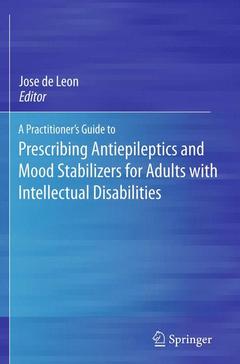Description
A Practitioner's Guide to Prescribing Antiepileptics and Mood Stabilizers for Adults with Intellectual Disabilities, 2012
Coordinator: de Leon Jose
Language: English
Subjects for A Practitioner's Guide to Prescribing Antiepileptics and...:
Keywords
Aggression and intellectual disabilities; Anticonvulsants and intellectual disabilities; Antiepileptic drugs and intellectual disabilities; Bipolar disorder and intellectual disabilities; Carbamazepine and intellectual disabilities; Clonazepam and intellectual disabilities; Diazepam and intellectual disabilities; Epilepsy ethosuximide and intellectual disabilities; Felbamate and intellectual disabilities; Gabapentin and intellectual disabilities; Intellectual disabilities; Lacosamide and intellectual disab
507 p. · 15.5x23.5 cm · Paperback
Description
/li>Contents
/li>Comment
/li>
Emotional, behavioral, and neuropsychiatric conditions are common in individuals with intellectual disabilities (IDs), most notably epilepsy, aggression, self-injurious behaviors, and bipolar and other mood disorders. Despite the prevalence of such problems, there is a scarcity in the literature of reliable information on medical treatments for those with IDs.
A Practitioner's Guide to Prescribing Antiepileptics and Mood Stabilizers for Adults with Intellectual Disabilities provides a detailed framework for prescribing for this challenging population. Featuring the most up-to-date information on factors that inform prescribing, the Guide addresses basic issues and controversies (e.g., the rift between evidence-based and personalized medicine) in treating adults with cognitive deficits. Clients' specific needs are emphasized in developing appropriate and effective pharmacological intervention for improved outcomes and quality of life. Drugs discussed in the Guide include carbamazepine, clonazepam, diazepam, ethosuximide, felbamate, gabapentin, lacosamide, lamotrigine, levetiracetam, lithium, lorazepam, oxcarbazepine, phenobarbital, phenytoin, pregabalin, primidone, rufinamide, tiagabine, topiramate, valproate, and zonisamide. For each of these compounds, the guidelines cover:
- Indications for use; relative and absolute contraindications.
- Assessment during treatment; therapeutic drug monitoring; warning signs and symptoms for caretakers.
- Dosage: administration; initial and maximum recommended dosage; modifications associated with drug-drug interactions, personal characteristics, and (where appropriate) genetic variations.
- Adverse drug reactions: common, relatively uncommon, and potentially lethal, plus risk of metabolic syndrome.
- Guidelines for discontinuation.
- References, tables, and drug utilization reviews.
A Practitioner's Guide to Prescribing Antiepileptics and Mood Stabilizers for Adults with Intellectual Disabilities is an indispensable decision-making reference for psychiatrists, neuropsychologists, psychopharmacologists, neurologists, internists, and clinical psychologists.
1. Introduction.- 2. A Practitioner’s Guide to Prescribing Carbamazepine for Adults with Intellectual Disabilities.- 3. A Practitioner’s Guide to Prescribing Clonazepam for Adults with Intellectual Disabilities.- 4. A Practitioner’s Guide to Prescribing Diazepam for Adults with Intellectual Disabilities.- 5. A Practitioner’s Guide to Prescribing Ethosuximide for Adults with Intellectual Disabilities.- 6. A Practitioner’s Guide to Prescribing Felbamate for Adults with Intellectual Disabilities.- 7. A Practitioner’s Guide to Prescribing Gabapentin for Adults with Intellectual Disabilities.- 8. A Practitioner’s Guide to Prescribing Lacosamide for Adults with Intellectual Disabilities.- 9. A Practitioner’s Guide to Prescribing Lamotrigine For Adults with Intellectual Disabilities.- 10. A Practitioner’s Guide to Prescribing Levetiracetam for Adults with Intellectual Disabilities.- 11. A Practitioner’s Guide to Prescribing Lithium for Adults with Intellectual Disabilities.- 12. A Practitioner’s Guide to Prescribing Lorazepam for Adults with Intellectual Disabilities.- 13. A Practitioner’s Guide to Prescribing Oxacarbazepine for Adults with Intellectual Disabilities.- 14. A Practitioner’s Guide to Prescribing Phenobarbital for Adults with Intellectual Disabilities.- 15. A Practitioner’s Guide to Prescribing Phenytoin for Adults with Intellectual Disabilities.- 16. A Practitioner’s Guide to Prescribing Pregabalin for Adults with Intellectual Disabilities.- 17. A Practitioner’s Guide to Prescribing Primidone for Adults with Intellectual Disabilities.- 18. A Practitioner’s Guide to Prescribing Rufinamide for Adults with Intellectual Disabilities.- 19. A Practitioner’s Guide to Prescribing Tiagabine for Adults with Intellectual Disabilities.- 20. A Practitioner’s Guide to Prescribing Topiramate for Adults with Intellectual Disabilities.- 21. A Practitioner’s Guide to Prescribing Valproate for Adults with Intellectual Disabilities.- 22. A Practitioner’s Guide to Prescribing Zonisamide for Adults with Intellectual Disabilities.- 23. A Practitioner’s Guide to Prescribing Non-oral Antiepileptics for Adults with Intellectual Disabilities.- 24. Conclusion.
Examines a complex and neglected area of medicine – that is, treating adults with intellectual disabilities with anticonvulsants and mood stabilizers
Offers uniquely comprehensive and practical guidelines
Addresses both psychiatric (mood stabilizers) and neurological (anticonvulsants) drugs
Each chapter provides a guideline that can be downloaded independently Each guideline is summarized in a drug utilization review




